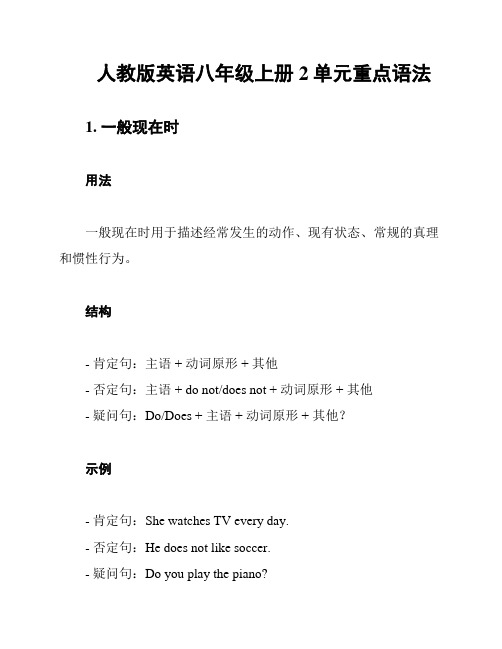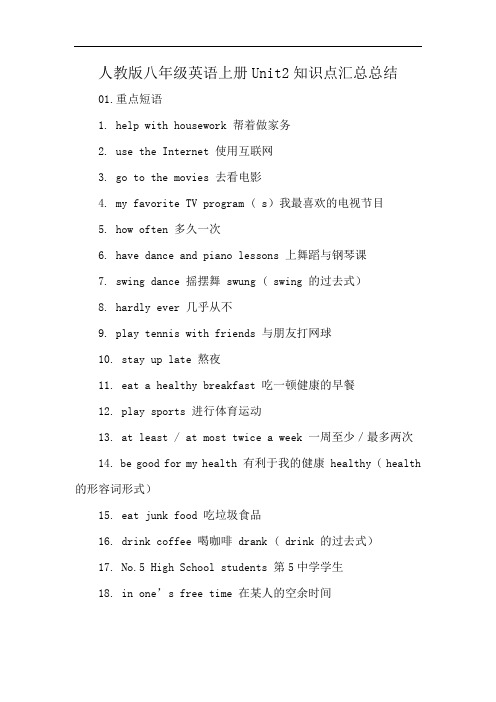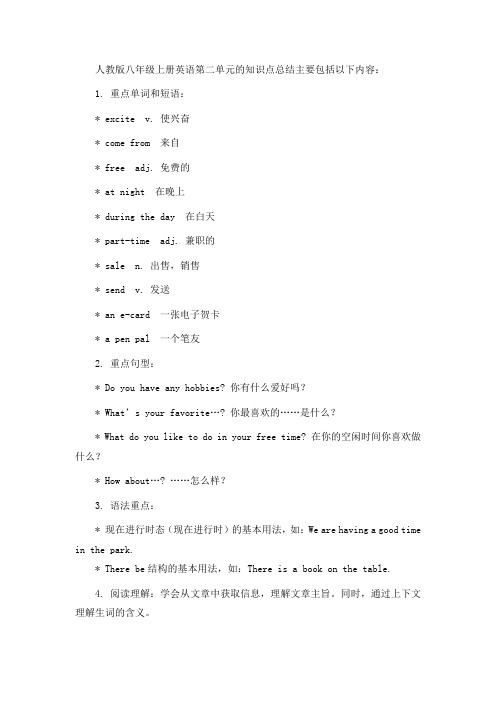人教版英语八年级上册第二单元短语语法知识点总结
[荐]人教版八年级上册英语第二单元重点知识汇总(单词,短语,语法)
![[荐]人教版八年级上册英语第二单元重点知识汇总(单词,短语,语法)](https://img.taocdn.com/s3/m/ed4595bea300a6c30c229fd5.png)
人教版八年级上册英语第二单元重点知识汇总(单词,短语,语法)Unit 2 How often do you exercise?v 重要短语1. help with housework 帮助做家务do housework 做家务2. hardly ever 几乎不eg: She hardly ever helps with housework.3. once a week 一周一次twice a month 一月两次three times a week 一周三次a few times a week 一周几次one to four times a week一周一至四次once or twice a week一周一两次4. use the Internet 使用网络eg: I use the Internet about once a week.5. have piano lessons上钢琴课eg: I have piano lessons twice a week.6. at least 至少eg: He plays soccer at least twice a week.7. eat a healthy breakfast[吃一顿健康的早餐8. improve one’s English 提高某人的英语eg: We can improve our English by watching English movies.我们可以通过看英文电影提高英语。
9. junk food 垃圾食品10. be good for 对......有益be bad for...对.....有害eg: Don’t eat too much junk food because it’s not good for our health. 不要吃太多垃圾食品因为它对我们的健康有害。
11. want sb to do sth 想让某人去做某事eg: My mother wants me to drink milk every day because it’s good for my health.12. in one's free time 在某人的空闲时间13. the result of… ......的结果14. Here are the results. 这是结果。
人教版英语八年级上册2单元重点语法

人教版英语八年级上册2单元重点语法1. 一般现在时用法一般现在时用于描述经常发生的动作、现有状态、常规的真理和惯性行为。
结构- 肯定句:主语 + 动词原形 + 其他- 否定句:主语 + do not/does not + 动词原形 + 其他- 疑问句:Do/Does + 主语 + 动词原形 + 其他?示例- 肯定句:She watches TV every day.- 否定句:He does not like soccer.- 疑问句:Do you play the piano?2. 一般过去时用法一般过去时用于描述过去发生的动作和存在的状态。
结构- 肯定句:主语 + 动词过去式 + 其他- 否定句:主语 + did not + 动词原形 + 其他- 疑问句:Did + 主语 + 动词原形 + 其他?示例- 肯定句:I visited my grandparents last weekend.- 否定句:He did not finish his homework.- 疑问句:Did they go to the park?3. 一般将来时用法一般将来时用于描述将来发生的动作和事件。
结构- 肯定句:主语 + will + 动词原形 + 其他- 否定句:主语 + will not + 动词原形 + 其他- 疑问句:Will + 主语 + 动词原形 + 其他?示例- 肯定句:We will have a party next week.- 否定句:She will not attend the meeting.以上是人教版英语八年级上册第二单元重点语法的概述。
希望对您有所帮助!。
人教版八年级英语上册Unit2知识点汇总总结

人教版八年级英语上册Unit2知识点汇总总结01.重点短语1. help with housework 帮着做家务2. use the Internet 使用互联网3. go to the movies 去看电影4. my favorite TV program ( s)我最喜欢的电视节目5. how often 多久一次6. have dance and piano lessons 上舞蹈与钢琴课7. swing dance 摇摆舞 swung ( swing 的过去式)8. hardly ever 几乎从不9. play tennis with friends 与朋友打网球10. stay up late 熬夜11. eat a healthy breakfast 吃一顿健康的早餐12. play sports 进行体育运动13. at least / at most twice a week 一周至少/最多两次14. be good for my health 有利于我的健康 healthy ( health 的形容词形式)15. eat junk food 吃垃圾食品16. drink coffee 喝咖啡 drank ( drink 的过去式)17. No.5 High School students 第5中学学生18. in one’s free time 在某人的空余时间19. ask them about their free time activities 询问他们关于他们的业余活动20. not … at all 根本不…21. go online 上网22. be surprised that ..感到惊讶23. use it for fun 为了取乐而使用它24. the answers to the questions 这些问题的答案25. one to three times a week 一周一到三次26. two percent of the students 2%的学生27. the best way to do sth.做某事的最好方式28. such as 例如29. spend time with your friends 与你的朋友共度时光spent ( spend 的过去式)30. spend time on sth./ in doing sth.花时间在某事上/做某事31. play together 一起玩32. watch TV for over 2 hours 看两个多小时电视33. go to the dentist 去看牙医34. a 16-year-old high school student 一名16岁的中学生35. have a lot of good habits 有许多好习惯36. more / less than two hours 多/少于两小时37. go to the dentist for teeth cleaning 去牙医处清洁牙齿38. go to the shopping center 去购物中心02.重点句子语法聚焦1. --What do you usually do on weekends?你在周末通常做什么?--I always exercise.我总是锻炼。
人教版八年级上册英语第二单元知识点总结

人教版八年级上册英语第二单元的知识点总结主要包括以下内容:1. 重点单词和短语:* excite v. 使兴奋* come from 来自* free adj. 免费的* at night 在晚上* during the day 在白天* part-time adj. 兼职的* sale n. 出售,销售* send v. 发送* an e-card 一张电子贺卡* a pen pal 一个笔友2. 重点句型:* Do you have any hobbies? 你有什么爱好吗?* What’s your favorite…? 你最喜欢的……是什么?* What do you like to do in your free time? 在你的空闲时间你喜欢做什么?* How about…? ……怎么样?3. 语法重点:* 现在进行时态(现在进行时)的基本用法,如:We are having a good time in the park.* There be结构的基本用法,如:There is a book on the table.4. 阅读理解:学会从文章中获取信息,理解文章主旨。
同时,通过上下文理解生词的含义。
5. 写作练习:学会描述自己的爱好、空闲时间活动等,可以通过写日记、邮件等方式进行练习。
6. 听力训练:通过听力材料,提高听力和理解能力,同时学习常用的日常交际用语。
7. 口语练习:通过角色扮演、小组讨论等方式,练习口语表达和交流能力。
8. 文化背景知识:了解不同国家的文化背景和习惯用语,提高跨文化交际能力。
以上是第二单元的主要知识点总结,学生需要重点掌握并熟练运用。
同时,通过大量的阅读、写作、听力和口语练习,提高英语综合运用能力。
八年级上册英语人教版第二单元笔记

八年级上册英语人教版第二单元笔记一、重点单词。
1. housework.- 不可数名词,意为“家务劳动;家务事”。
例如:I often help my mother with the housework.(我经常帮助我妈妈做家务。
)2. hardly.- 副词,意为“几乎不;几乎没有”,本身具有否定意义。
例如:He can hardly speak English.(他几乎不会说英语。
)3. ever.- 副词,意为“在任何时候;从来;曾经”。
例如:Have you ever been to Beijing?(你曾经去过北京吗?)4. once.- 副词,意为“一次;曾经”。
作“一次”讲时,可用于表示频率。
例如:I go to the movies once a week.(我每周去看一次电影。
)5. twice.- 副词,意为“两次;两倍”。
例如:I have read this book twice.(我已经读过这本书两次了。
)6. Internet.- 名词,意为“(国际)互联网;因特网”。
例如:We can get a lot of information on the Internet.(我们能在互联网上得到很多信息。
)7. program.8. full.- 形容词,意为“忙的;满的;充满的”。
be full of = be filled with,意为“充满……”。
例如:The glass is full of water.(杯子里装满了水。
)9. maybe.- 副词,意为“大概;或许;可能”,通常放在句首。
例如:Maybe he is at home.(也许他在家。
)10. swing.- 名词,意为“摆动;秋千”;作动词时,意为“(使)摆动;摇摆”。
例如:There is a swing in the park.(公园里有一个秋千。
)The monkey is swinging from tree to tree.(猴子在树间荡来荡去。
人教版八年级英语上册第二单元必背课文、单词、重点短语与语法梳理汇总

八年级英语上册第二单元必背课文、单词、重点短语与语法梳理汇总一、必背课文2b 文章部分《What Do No. 5 High School Students Do in Their Free Time?》Last month we asked our students about their free time activities. Our questions were about exercise, use of the Internet and watching TV. Here are the results.We found that only fifteen percent of our students exercise every day. Forty -five percent exercise four to six times a week. Twenty percent exercise only one to three times a week. And twenty percent do not exercise at all!We all know that many students often go online, but we were surprised that ninety percent of them use the Internet every day. The other ten percent use it at least three or four times a week. Most students use it for fun and not for homework.The answers to our questions about watching TV were also interesting. Only two percent of the students watch TV one to three times a week. Thirteen percent watch TV four to six times a week. And eighty - five percent watch TV every day! Although many students like to watch sports, game shows are the most popular.It is good to relax by using the Internet or watching TV, but we think the best way to relax is through exercise. It is healthy for the mind and the body. Exercise such as playing sports is fun, and you can spend time with your friends and family as you play together. And remember, “old habits die hard.” So start exercising before it's too late!这篇文章是对学生课余活动调查结果的呈现,有以下重点:-频率副词的使用:如“every day”“four to six times a week”“one to three times a week”等,生动地展示了不同活动的开展频率。
人教版八年级上英语第二单元知识点总结
人教版八年级上英语第二单元知识点总结一、语法知识点总结1. 一般现在时在人教版八年级上英语第二单元中,我们学习了一般现在时的用法。
一般现在时表示习惯性、经常性或普遍性的动作或状态。
例如:She usually goes to the park on Sundays. (她通常在星期天去公园。
)2. 现在进行时现在进行时表示现阶段正在进行的动作。
例如:I am reading a book now. (我现在正在读一本书。
)3. 物主形容词物主形容词用来表达人或物所拥有的事物。
例如:My father’s car is blue. (我爸爸的车是蓝色的。
)4. 物主代词物主代词与名词具有相同的作用,用来表示所属关系。
例如:This is your book. (这是你的书。
)5. 反身代词反身代词用来强调主语,表示动作的主语也是动作的受事。
例如:Ihurt myself when I fell. (我摔倒时弄伤了自己。
)二、重点词汇总结1. join in 参加2. activity 活动3. club 俱乐部4. exercise 练习5. conversation 对话以上是对人教版八年级上英语第二单元的语法知识点和重点词汇进行了总结。
总结回顾:在本单元中,我们学习了一系列与日常生活相关的语法知识点和重点词汇。
通过掌握这些知识点和词汇,我们可以更好地表达自己,理解他人说的话,并参与到各种英语活动中去。
通过学习这些知识点和词汇,我们也可以更好地理解和使用一般现在时、现在进行时等语法知识,提高自己的英语水平。
个人观点和理解:学习语言需要不断地积累和实践,只有通过不断地实践,我们才能更好地掌握语言。
在学习英语的过程中,我们要注重词汇的积累和语法知识的理解,同时要多参与各种英语活动,提高自己的口语表达能力。
只有这样,我们才能真正地运用所学的知识,流利地表达自己的想法。
结语:通过本文的总结和回顾,相信大家对人教版八年级上英语第二单元的知识点有了更深入的理解。
人教版八年级英语上册Unit2单词及短语(附例句)
人教版八年级英语上册Unit2单词及短语(附例句)【重点单词】1.housework ['haʊswɜːk] n.家务劳动Xiao Ming helps his mother do housework every day.小明每天帮妈妈做家务。
2.hardly ['hɑːdli] adv.几乎不;简直不;刚刚We hardly ever go out on the weekends.我们很少在周末出去。
Mother hardly ever gets angry with us.母亲几乎从不对我们生气。
3.ever ['evə(r)] adv.曾经;在任何时候I have ever visited the Great Wall.我曾经参观过长城。
4.once [wʌns] adv.一次;曾经I go to the library once a week.我每周去一次图书馆。
5.twice [twaɪs] adv.两倍;两次You can't go to the same place twice.你不可能两次去同一个地方。
6.Internet ['ɪntənet] n.因特网We can get a lot of information from the Internet.我们可以从互联网上得到很多信息。
7.program ['prəʊɡræm] n.节目;程序;课程;节目单This TV program is the best of all.这个电视节目是所有节目中最好的。
This TV program is much better than that one这个电视节目比那个好得多8.full [fʊl] adj.满的;充满的;完全的The bottle is full of milk.瓶子里装满了牛奶。
9.swing [swɪŋ] n.摇摆;秋千v.摇摆;旋转The little sister is swing with her friends.小妹妹正在和她的朋友们荡秋千。
Unit2单元短语归纳人教版八年级英语上册
UNIT 2 Words and Expressions1帮助做家务help with housework2去购物go shopping3几乎不hardly ever4在周末on weekends5去看电影go to the movies6一周一次(两次)once /twice a week7一周三四次three to four times a week8怎么会呢?How e?9上舞蹈和钢琴课have dancing and piano lessons 10至少at least11吃健康的早餐eat healthy breakfast12熬夜stay up late13早睡go to bed early14参加运动play sports15想我喝牛奶want me to drink milk17好(坏)习惯good/bad habits18多少小时how many hours19.吃太多的垃圾食物eat too much junk food20使用网络use the Internet21在乡村野营go camping in the countryside22网络的使用the use of the Internet23这儿有些调查的结果Here are the results.24仅仅百分之十五only fifteen percent25一周四到六次four to six times a week26根本不not…at all27上线go online28消遣for fun29这些问题的答案the answers to these questions30通过上网和看游戏节目来放松relax by using the Internet and watching game shows31最好的放松的方法the best way to relax32例如参加运动such as playing sports33和…..度过时光spend time with sb34旧习难改Old habits die hard.34赶快锻炼,不要等到来不及了So start exercising before it’s too late35一个16岁的高中生a sixteenyearold high school student36吃汉堡eat hamburgers37几乎每天hardly every day38不到6小时_less than six hours39保持健康keep healthy40读报read a newspaper41从不上班迟到never be late for work42看英语书read English books43我最喜欢的电视节目my favorite program 44停止吃垃圾食物stop eating junk food45害怕做…be afraid to do sth46向别人求助ask sb for help47 想我不要上线want me not to go online 48休闲时间的活动free time activities4 9学会放松learn to relax50对……有害be bad for。
人教版八年级上册第二单元知识点归纳
第二单元:一、大的语法点1、How 如何(方式)how often多久一次(频率)答语常用“Always/ often/ every day/…”或“次数+时间”等表频率的状语例如:How often do you watch TV? ----Twice a week.一次once 两次twice 三次或三次以上基数词+ times three times four times How come?怎么回事?怎么会?表示某件事情很奇怪,有点想不通;可单独使用,也可引导一个问句。
相当于疑问词why。
但how come 开头的特殊疑问句使用的仍是陈述语序。
How come you didn't tell me about it? = Why you didn't tell me about it?how long 多长(时间)答语常用“(For/ about +)时间段”how far多远(距离)答语常用“(It’s +)数词+miles/ meters/ kilometers”how many多少(接可数名词)how much(接不可数名词)2、频度副词1. 频度副词的含义(1) 表示次数、频率的副词称为频度副词。
常用的频度副词按高低依次为always > usually > sometimes > seldom > hadly ever > never100% 80% 60% 30% 10% 0%(2) 表示具体的频率、次数时,一次用once,两次用twice,三次或三次以上用“基数词+times”表示: three times, four times, six times2. 频度副词在句中的位置(1 )频度副词一般在动词之前,be 动词、情态动词之后E.g. We never eat junk food.Lucy is sometimes very busy.I can hardly say a word.3. 对频度副词提问时,用how oftenE.g. ---How often do you go to the movies? ---Once a month3. It is good to relax by using the Internet of watching game shows, but we think the best way torelax is through exercise. 通过使用因特网看娱乐节目来放松很不错,但是我们认为最好的放松方式是通过锻炼来放松。
- 1、下载文档前请自行甄别文档内容的完整性,平台不提供额外的编辑、内容补充、找答案等附加服务。
- 2、"仅部分预览"的文档,不可在线预览部分如存在完整性等问题,可反馈申请退款(可完整预览的文档不适用该条件!)。
- 3、如文档侵犯您的权益,请联系客服反馈,我们会尽快为您处理(人工客服工作时间:9:00-18:30)。
Unit 2 How often do you exercise 一、词组、短语:01、help with housework 帮助做家务活,02、go shopping 购物,03、on weekends 在周末,04、how often 多久一次,05、hardly ever几乎不,06、once a week 每周一次,07、twice a month每月二次,08、go to the movies去看电影,09、every day 每天,10、use the Internet上网/用网,11、be free有空,12、have dance and piano lessons 上舞蹈钢琴课,13、swing dance摇摆舞14、play tennis 打网球,15、stay up late熬夜,16、at least至少,17、go to bed early 早睡,18、 play sports 锻炼身体,19、be good for 对…有好处,20、go camping去野营,21、in one’s free time 在某人的空闲时间,22、not….at all 根本不,23、the most popular 最流行,24、such as例如,25、go to the dentist去看牙医,26、more than 超过/多于,27、Old habits die hard.旧习惯难改。
28、 hard=difficult 困难的,29、less than 少于/不到二、重要句子(语法):What do you usually do on weekends你周末通常做什么 I always exercise.总是锻炼身体。
What do they do on weekends他们周末干什么 They often help with housework.他们经常帮助干家务活。
What does she do on weekends 她周末干什么 She sometimes goes shopping.她有时购物。
How often do you go to the movies 你多久看电影一次I go to the movies maybe once a month.可能一个月看一次。
How often does he watch TV 他多久看电视一次 He hardly ever watches TV.他几乎不看电视。
Do you go shopping 你购物吗 No, I never go shopping.不,我从来就不购物。
三、习惯用法、搭配01. help sb. with sth 帮助某人做某事02. How about… =What about…….怎么样03. want sb. to do sth. 想让某人做某事04. How many + 可数名词复数+ 一般疑问句…有多少05. 主语+ find+ that 从句…发现…06. It’s + adj.+ to do sth. 做某事是….的07. spend time with sb. 和某人一起度过时光08. ask sb. about sth. 向某人询问某事09. by doing sth. 通过做某事10. What’s your favorite….. 你最喜欢的……是什么11 start doing sth. 开始做某事12. the best way to do sth. 做某事的最好方式四、词语辨析Section A1. help with housework 帮助做家务(教材第9页)(1) help with sth. 意为“帮助做某事”拓展:help sb. with sth.= help sb. (to) do sth. 帮助某人做某事Eg: I often help him with his English.= I often help him (to) learn English. 我经常帮他学习英语。
(2)housework 意为“家务劳动”。
不可数名词。
1. They have housework to . many B. much2. sometimes 有时(教材第9页)辨析:sometimes ,some times ,sometime , some timesometimes 有时候。
=at times也是“有时”的意思。
提问用how oftensome times 几次。
time作可数名词时可作“次数”解;表示“时间”时是不可数名词。
How mang times sometime 某个时候。
可指过去或将来的某个时候。
提问用whensome time 一段时间。
常与for连用。
对它提问用how long 。
口诀记忆:分开“一段时间”;相聚“某个时候”。
Eg:Sometimes I get up very late. 有时我起床很晚。
I will go to shanghai sometime next week. 下周某个时候我要去上海。
He reads the story some times. 他读这个故事几遍了。
I’ll stay here for some time. 我将会在这儿呆一段时间。
练习:① We plan to stay in Hainan for . 我们打算在海南呆一段时间。
② I am sure that we have met before. 我肯定我们之前见过几次了。
③ I have letters from him. 有时我会收到他的来信。
3. hardly ever 几乎不(教材第9页)hardly ever相当于hardlyeg:There is hardly any food left. 几乎没有食物剩下。
辨析:hardly 与hardhardly 几乎不,一般位于动词之前。
hard 努力,位于动词之后。
eg:He hardly works. 他几乎不工作。
He works hard. 他工作努力。
4. use the Internet 用互联网(教材第10页)use sth. to do sth. 用某物做某事eg:I use a knife to cut bread. 我用刀切面包。
短语:on the Internet 在网上, surf the Internet 网上冲浪,上网5. What’s your favorite program 你最喜欢的节目是什么(教材第10页)句型:What’s your favorite...=What... do you like best你最喜欢的......是什么’s your favorite animal你最喜欢的动物是什么= __________________________________________6. Are you free next week 你下周有空吗(教材第10页)free 意为“空闲的,有空的”,反义词busy。
be free 意为“闲着,有空”eg::He is free now.他现在有空。
拓展:free还可译为“免费的”Eg:The tickets are free. 票是免费的。
7. ... next week is quite full for me... …下周对我来说相当忙…(教材第10页)quite full 很忙,相当忙.拓展:①full 还可译为“满的,充满的”。
Eg:The bus was full when they got there. 翻译________________________________________②full 还可译为“饱的”。
Eg:I can’t eat any more,I am quite full. 我不能再吃了,我相当饱了。
8. How come 怎么会怎么回事表示某件事情很奇怪,有点想不通;可单独使用,也可引导一个问句,相当于疑问句why, 但 how come 开头的特殊疑问句使用的仍然是陈述语序。
How come Tom didn’t come to the party = Why didn’t Tom come to the party9. I have dance and piano lessons. 我要上舞蹈课和英语课。
(教材第10页)have 在此意为“上……课”。
Eg: They’re having an English lesson. 他们正在上英语课。
扩展:have lessons 上课, Lesson One 第一课10. Well ,how about Tuesday 哦,那周二呢(教材第10页)How about... (=What about...) 意为“……怎么样”,用来征求对方的意见。
Eg: How about this book 这本书怎样How / What about doing sth. ... 做……怎么样Eg:---What will we do on Sunday 星期天我们什么---How about visiting the museum 去参观博物馆咋样1. It’s sunny today,What about ________(play)tennis11. I go to the movies maybe once a month. 我大概每月去看一次电影。
(教材第11页)go to the movies ________________maybe 意为“也许,大概,可能”,常位于句首。
Eg:Maybe he knows Tom. 也许他认识Tom。
辨析:maybe 和may beLily an English teacher. Lily可能是一名英语老师。
=________________________________________12. He plays at least twice a week. 他至少每周踢两次(球)。
(教材第11页)at least 意为“至少”。
其反义词为at most “最多”。
Eg:There are at least 1,500 students in our school. _____________________________________。
Section B1. But my mother wants me to drink it. 但我妈妈想让我喝它。
(教材第12页)want sb. to do sth. 意为“想让某人做某事”,否定形式为want sb. not to do sth. 意为“不想让某人做某事”。
